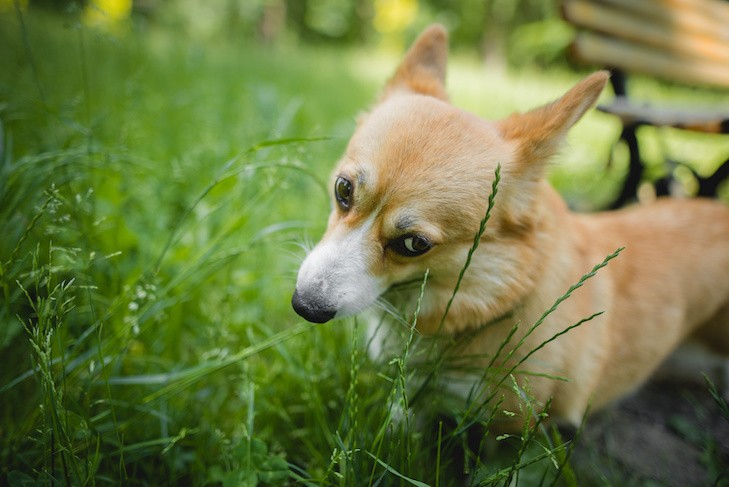Discovering your dog indulging in a snack of poop can be a truly unpleasant experience for any dog owner. This behavior, known scientifically as coprophagia (kop-ruh-fey-jee-uh), is more common than you might think, and while it’s certainly off-putting to us, understanding the reasons behind it is the first step to addressing it. It’s important to know that while disgusting to humans, poop eating isn’t necessarily motivated by a desire to upset you. In fact, there are both behavioral and physiological reasons why some dogs find feces appealing. If your furry friend has this habit, take heart – there are effective strategies, from behavior modification to readily available products, that can help deter your dog from this unsavory practice.
According to research presented at the American Veterinary Society of Animal Behavior annual conference by Dr. Benjamin Hart and his team at the University of California, Davis, coprophagia is quite prevalent. Their study, based on surveys of nearly 3,000 dog owners, revealed some surprising statistics:
- A significant 16% of dogs were classified as “serious” poop eaters, meaning they were observed eating poop five or more times. You can find more details in the conference proceedings.
- Nearly a quarter of dogs, 24%, were seen eating poop at least once.
Dr. Hart concluded that this behavior might stem from an “innate predisposition” inherited from their wild canine ancestors. In nature, eating fresh stools could have been a survival mechanism to protect pack members from intestinal parasites that might contaminate their living spaces. Essentially, it’s possibly ingrained in a dog’s DNA to consider poop as a potential food source.
Dogs evolved as scavengers, accustomed to consuming whatever they could find, whether it was scraps on the ground or discarded items. Their definition of palatable food differs significantly from ours. Animal behaviorist Steven R. Lindsay, in his book, Handbook of Applied Dog Behavior and Training, suggests coprophagia might be a survival behavior developed to cope with periods of food scarcity. When resources are limited, being selective about food isn’t an option.
Is Eating Poop Normal Dog Behavior?
For certain species, like rabbits, eating poop is a completely normal and crucial process for nutrient absorption. Rabbits actually require this to maintain their health, and young rabbits need it to thrive. Luckily, dogs don’t rely on poop for essential nutrients. However, coprophagia is still considered a normal behavior in dogs during specific life stages.
Mother dogs instinctively lick their puppies to stimulate elimination and then consume their puppies’ feces for approximately the first three weeks after birth. Puppies also naturally engage in coprophagia, eating their own poop (autocoprophagia), poop from other dogs (allocoprophagia), and even feces from cats and other animals. Some dogs develop a particular fondness for horse manure or goose droppings.
While eating their own poop is generally not harmful to puppies, consuming poop from other animals can pose health risks. If the stool is contaminated with parasites, viruses, or toxins, it can lead to health issues in puppies. Fortunately, this poop-eating tendency usually diminishes as puppies mature, typically subsiding by the time they are around nine months old.
Alt text: Pembroke Welsh Corgi happily snacking on grass in a lush green park, showcasing a common canine outdoor behavior.
Decoding the Reasons Behind Adult Dog Coprophagia
If your adult dog suddenly starts eating poop, it’s essential to consult your veterinarian to rule out any underlying medical conditions. Several health issues can trigger coprophagia, including parasitic infections, certain medications like steroids, malabsorption syndromes, diabetes, Cushing’s Disease, thyroid disease, and other conditions that can lead to increased appetite or nutritional deficiencies. Nutrient and calorie-deficient diets can also drive dogs to eat poop in an attempt to compensate for these deficiencies.
In other instances, environmental stress or behavioral factors can be the root cause of coprophagia in adult dogs.
Isolation and Lack of Social Interaction
Research indicates that dogs kept in isolation, such as being confined to kennels or basements for extended periods, are more prone to eating poop compared to dogs who live closely with their families and receive regular interaction.
Confinement in Restrictive Spaces
Prolonged confinement in small areas can also contribute to the development of coprophagia. It’s often observed in dogs rescued from overcrowded animal shelters where they have experienced prolonged periods in confined spaces.
Anxiety and Stress Related to Potty Training
Anxiety, particularly stemming from harsh or punishment-based house training methods, can trigger coprophagia. The theory suggests that dogs who have been punished for accidents may eat their own poop to eliminate the evidence, inadvertently creating a negative cycle of anxiety and punishment.
Alt text: A forlorn Golden Retriever lying in grass, exhibiting signs of sadness and emotional distress, possibly linked to anxiety or loneliness.
Attention-Seeking Behavior
Dogs are intelligent creatures, and they quickly learn what actions elicit a reaction from their owners. Eating poop, undoubtedly, gets a strong reaction. If your dog discovers that eating poop grabs your attention, even negative attention, they might repeat the behavior. It’s crucial to avoid overreacting if you catch your dog in the act.
Misassociation with Food
Dogs fed in close proximity to their elimination areas might develop an incorrect association between the smell of food and feces, blurring the lines between what is food and what is not. Feeding and watering bowls should always be placed far away from designated potty areas.
Learned Behavior from Mother’s Scent
Steven R. Lindsay suggests that puppies might become confused by fecal odors on their mother’s breath after she cleans them. In some cases, mothers might regurgitate food mixed with puppy feces. This “appetitive inoculation” could potentially predispose puppies to develop coprophagia later in life.
Alt text: A gentle Cocker Spaniel mother attentively watching over her adorable puppy in an outdoor setting, depicting maternal care in dogs.
Instinct to Protect Pack Members
In multi-dog households, a healthy dog might consume the feces of a weaker or elderly dog, particularly if the latter suffers from fecal incontinence. Scientists speculate this could be linked to an instinct to protect the pack from predators by eliminating scents that could attract danger.
Effective Strategies to Stop Your Dog From Eating Poop
Veterinarians and dog owners have found various strategies helpful in curbing coprophagia. Identifying the underlying cause is key to choosing the most effective solution. Dogs eating poop due to a medical issue will require different approaches than those doing it for behavioral reasons like stress. If poop eating is an ongoing problem, consulting your veterinarian is the first and most important step. They can rule out medical causes and potentially refer you to a veterinary behaviorist if needed.
Vitamin and Mineral Supplements
A long-held theory suggests that nutritional deficiencies drive dogs to eat poop. Therefore, incorporating a high-quality dog multivitamin into their diet might be beneficial. Vitamin B deficiency, in particular, has been suspected, and research has supported this. A 1981 study demonstrated that microbial activity in feces can synthesize thiamine, a B-vitamin, indicating a potential link. Other studies have pointed to other missing nutrients as potential triggers.
Digestive Enzyme Supplements
Modern canine diets are often higher in carbohydrates and lower in meat-based proteins and fats compared to the ancestral diets of dogs. Some dog owners have seen positive results using digestive enzyme supplements for dogs. Some of these supplements contain papain, a digestive enzyme, which might aid in better nutrient absorption and reduce the urge to eat poop.
Taste-Aversion Products
The concept behind taste-aversion products is to make poop taste and smell as repulsive to dogs as it is to us. Poop-eating deterrent treats or deterrent powders added to food aim to make the resulting feces unappetizing. Common ingredients in these products include monosodium glutamate, chamomile, pepper-plant derivatives, yucca, garlic, and parsley. It’s crucial to remember that if you have multiple pets, all dogs (and cats, if applicable) in the household need to consume the deterrent for their poop to become unpalatable to the poop-eating dog. Some owners also use bitter-tasting sprays directly on feces to make them less appealing.
Alt text: A close-up portrait of a Pug with pleading puppy eyes, resting on a black leather chair, conveying a sense of vulnerability and need for attention.
Environmental Management and Training
Perhaps the most effective long-term solution to coprophagia lies in environmental management and consistent training. This includes having the appropriate equipment for feeding, training, and walking your dog.
Maintaining a clean living environment for your dog is paramount. This includes regularly cleaning your yard to eliminate any poop piles that could tempt your dog. When walking your dog, always supervise them closely and immediately pick up their poop.
Focus on reinforcing training cues like “leave it” and “come.” A simple and effective exercise is to train your dog to come to you for a tasty treat immediately after they poop. This helps them develop a positive association with coming to you after elimination, diverting their attention away from the poop on the ground.
If you have a cat, ensure the cat litter box remains clean and inaccessible to your dog. Consider using self-cleaning litter boxes designed to deter dogs or utilize a dog gate to restrict access to the litter box area.
Interesting Facts About Dogs and Poop Eating
Coprophagia in puppies is often considered a normal part of their exploratory phase as they navigate the world around them. While many puppies are content with sniffing and investigating the scents of poop, some are inclined to explore everything with their mouths, including feces.
One peculiar observation is that dogs rarely eat soft, poorly formed stools or diarrhea. They seem to prefer solid, well-formed feces. Frozen poop, surprisingly, is considered a particularly enticing treat for dogs who engage in coprophagia. Dr. Hart’s research also revealed other intriguing facts:
- Coprophagia is more prevalent in multi-dog households. Only 20% of dogs in single-dog homes exhibited poop-eating habits, compared to 33% in homes with three or more dogs.
- Dogs who eat poop are not inherently more difficult to housetrain than other dogs.
- Female dogs are more inclined to eat poop, while intact males are the least likely to do so.
- A significant 92% of poop eaters prefer fresh poop, only one to two days old.
- 85% of dog poop eaters primarily consume feces from other dogs, not their own.
- Dogs with greedy eating habits, such as those who steal food from tables, are more likely to be poop eaters.
If you observe your dog eating poop, consulting with your veterinarian is crucial. Identifying the underlying reasons for this behavior will guide you in finding the most appropriate solution and taking the necessary steps to help your dog break this habit.

